Khayelitsha demolitions
Heart? What Heart? City of Cape Town must answer in court after residents are violently turfed out of their homes
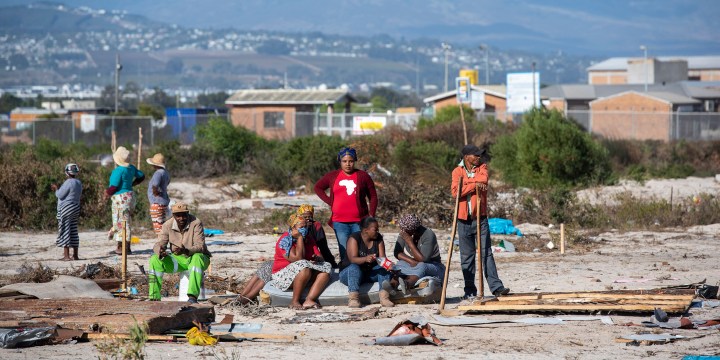
Violent clashes between the City of Cape Town and the people of Khayelitsha over a piece of occupied land owned by the city raise as many legal questions as they do ethical ones.
See an important update to this article below.
The legal question to be urgently considered by the Western Cape High Court on Friday 17 April includes whether an interdict obtained by the City of Cape Town in 2018 can be enforced against a different set of people. The added – and perhaps decisive – complication is the current State of Disaster that seems to prohibit all demolitions and evictions.
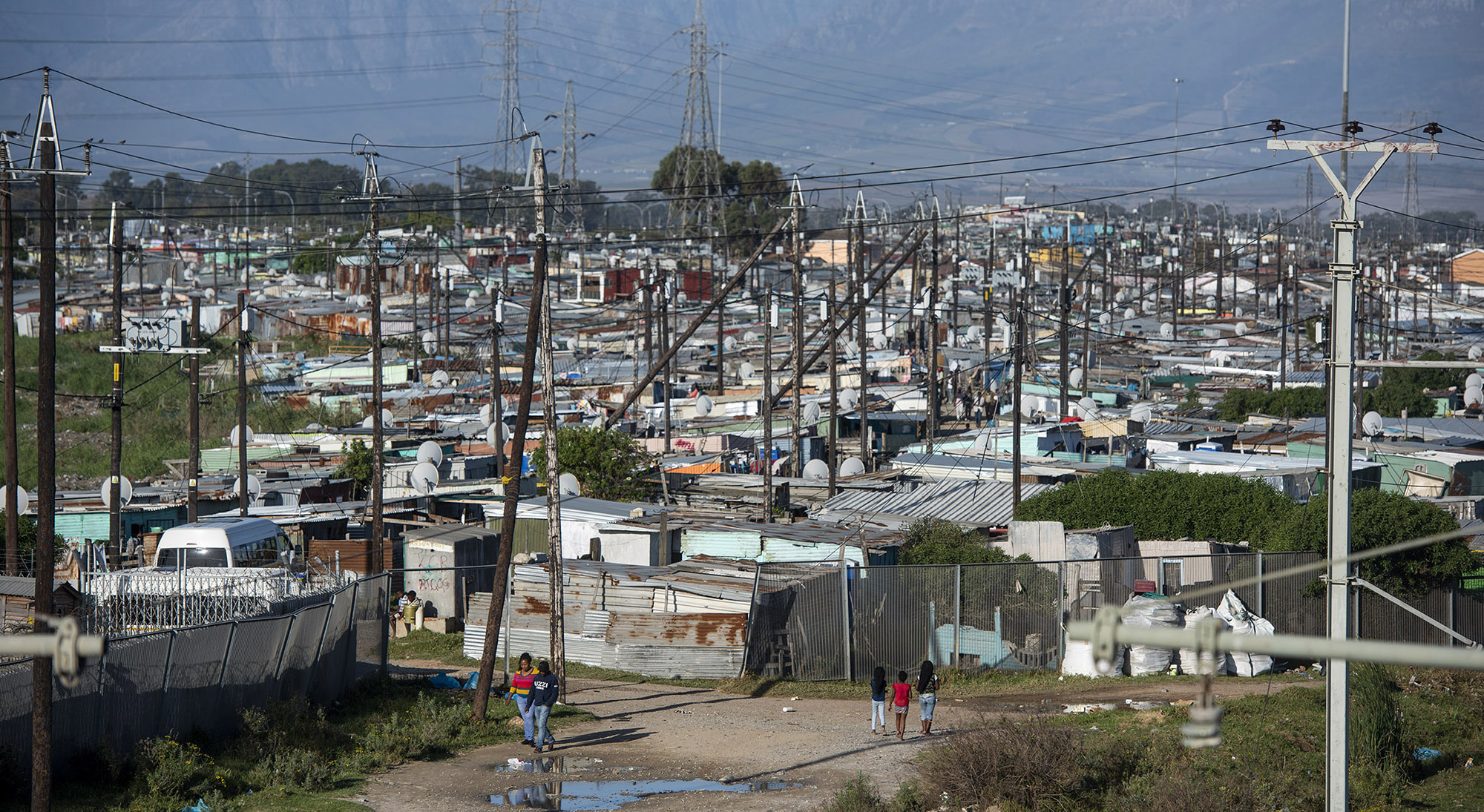
A view looking across RR Section informal settlement, Khayelitsha Cape Town COVID-19 lockdown, 14 April 2020. (Photo: David Harrison)
Where do you go when the government on the one hand breaks down your home and on the other enforces Covid 19-regulations allowing one to be arrested for not being at home, disheartened residents asked.
To defend its conduct, described as “constitutionally and legally abhorrent”, the City of Cape Town told its citizens that it had effected “no evictions” and had only demolished “unoccupied and incomplete structures”.
Their dilemma, in part, will be to explain away the video footage of Khayelitsha residents and journalists on the scene showing fully built and occupied structures complete with couches, stoves, cupboards and pit toilets.
***
“Come, look here. This was my table.”
We are standing on a barren, godforsaken piece of land in Khayelitsha next to Baden Powell Drive. It is 4pm on a Tuesday in April, the 19th day of South Africa’s coronavirus lockdown. What’s left of Selby Kolossa’s table is half-hidden under debris which on Thursday was the door to his home.
“This was my pit toilet. Look. Can you see?”
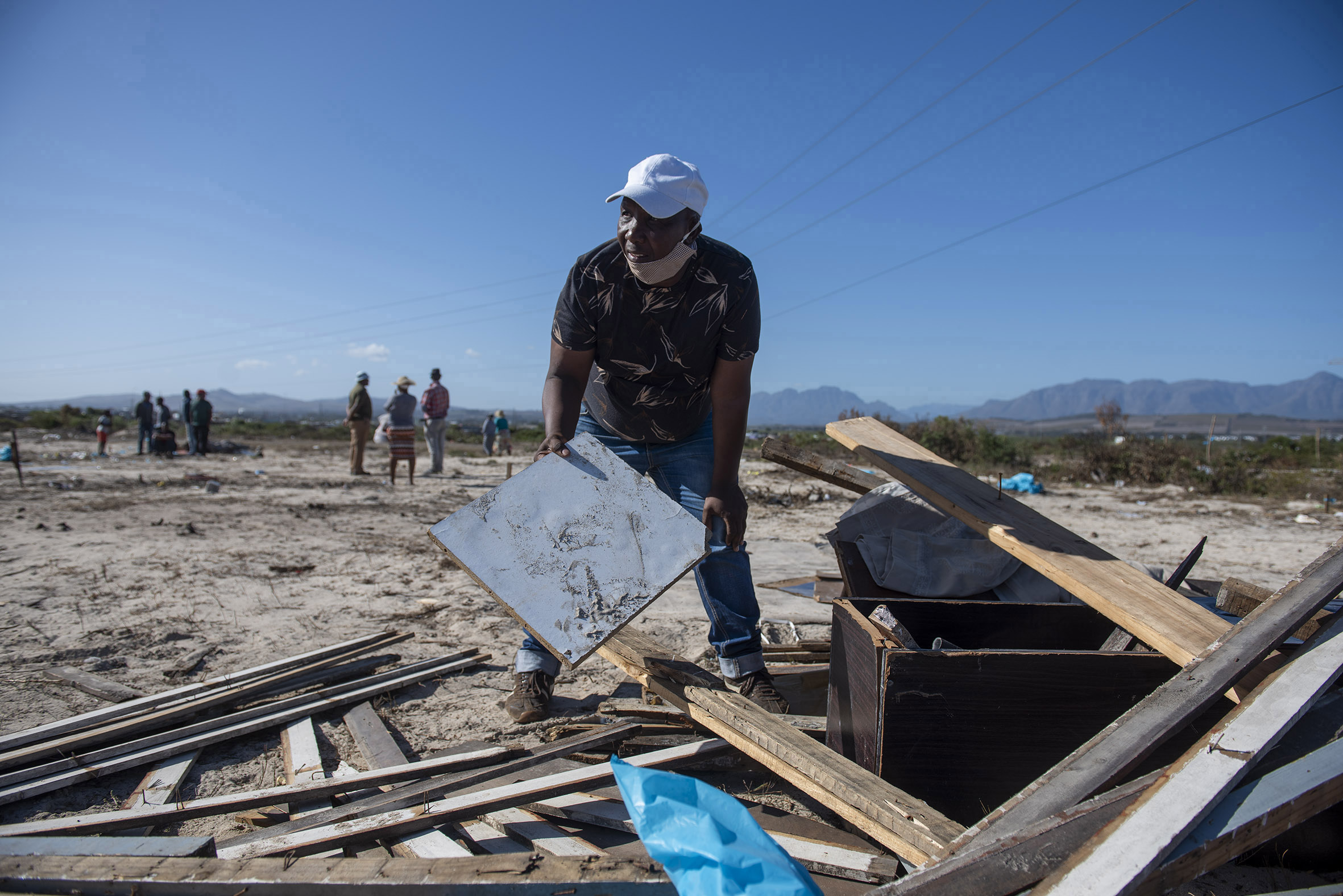
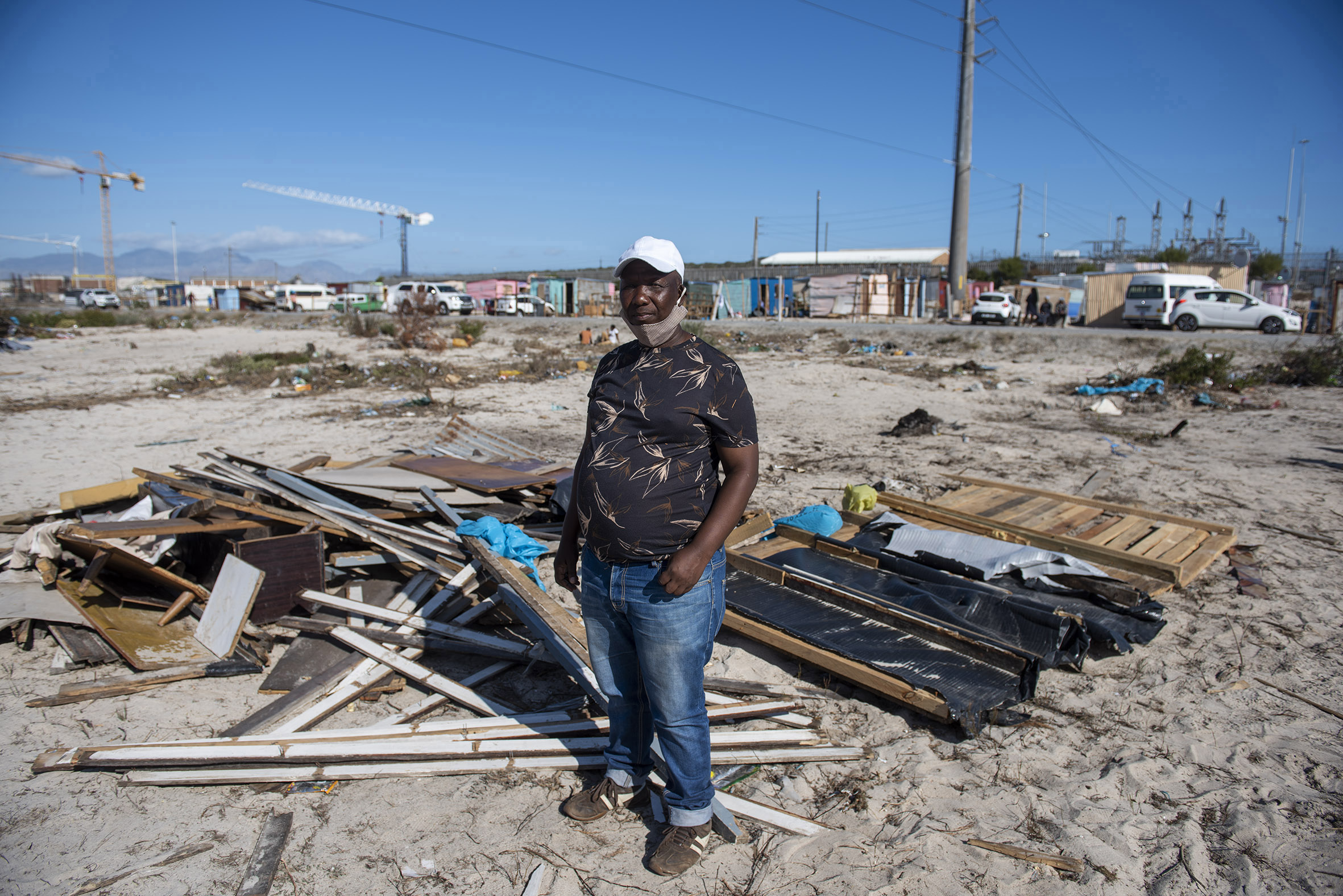
Selby Kolossa stands in front of the pile of wood and metal that was his home. City of Cape Town law enforcement evicted several hundred people from open ground they had occupied over the easter weekend. Khayelitsha Cape Town COVID-19 lockdown, 14 April 2020. (Photo: David Harrison)
I have so many questions, but Kolossa insists, willing me to focus on the “crime scene” at his feet. It took many hours to dig that pit toilet.
“Look.” He speaks over my questions. “This was my food cupboard. I had potatoes in here.” The cupboard is on its back in the Cape Flats’ dirty, powdery white sand, a single door left on its hinges.
One by one he points to and identifies the things he loves which made his life worthwhile, now lying ruined at his feet.
Kolossa, 52, is a panel beater. He operated his own workshop in Khayelitsha and has for the past 15 years been one of the estimated 500,000 people living in the suburb who predominantly fall within a low-income bracket. About 16% of residents in this area have no income.
Kolossa says he earned enough money to pay rent to live in a formal house, put his children through school and provide food for the table. He was a proud, hustling member of the informal economy. The coronavirus changed everything.
Mechanics aren’t “essential workers”.
No work, no money.
So Kolossa’s landlord kicked him out.
Taking the blow on the chin, Kolossa took his kids and the things he loved and searched for a piece of land where he could wait out the virus and its effects. Along with other people unable to afford their rent due to the lockdown and subsequent job loss, Kolossa set up shack towards the end of March in Empolweni informal settlement in Khayelitsha, on a piece of open land between Baden Powell Drive and Cebula/Lwesine streets, right across a narrow dirt road from other shacks. There is no water, sanitation or electricity. The nearest running water is more than 2km from the site.
On Thursday 9 April and on the eve of the Easter weekend, the City of Cape Town’s Law Enforcement unit allegedly “without warning” forcefully demolished a number of shacks, including Kolossa’s. Residents’ belongings and food were trampled and strewn on the ground.
Law Enforcement returned on Saturday, and again on Sunday. Then the clash became violent. The police entered the fray, and rubber bullets, stun grenades and tear gas were fired at residents and homes. More than 100 shacks were demolished over the Easter weekend.
GroundUp journalist Vincent Lali was on the scene and reported there was no provocation when officers started firing into the crowd. Activists and community members who were in the crowd said they were not violent and sang Struggle songs in front of the officials.
When asked by Daily Maverick whether the City’s officials were met with any violence from the community, the Mayco member for human settlements, Malusi Booi, said:
“Yes, at times. In addition, remember also that these members of the public were performing illegal acts of land invasion as well as in contravention of the national Covid-19 lockdown.”
The City attempted to support and justify its hard-handed act with a press statement this week stating it had to deal with 16 known attempted land invasions since the national lockdown on 26 March. (See the full response here)
“The City is not evicting anyone,” Booi claimed, “…only unoccupied and incomplete structures are being removed.
“The illegal occupation of vacant land during this period may have dire consequences. These illegal settlements have no access to services, which is a great concern because of the serious health and hygiene, fire, flood and safety risks.
“The City does not have the capacity to manage unplanned and unbudgeted settlements at the expense of existing settlements…. this also has a detrimental effect on the City’s mandate to provide housing to its most vulnerable residents and rightful beneficiaries.”
If the City of Cape Town’s goal was to remove residents from the site, the exercise was completely ineffective.
“Where must we go and what should we do?” resident Mthozami Xaka, 44, asked when Daily Maverick visited this week.
“We are told we cannot work because there is this Covid virus. Everyone must stay inside. How will we do that now?”
Destitute men and women now sleep under the stars where their homes once were, increasing their chances of falling ill and burdening the hospitals in their neighbourhood at a time these facilities cannot afford it.
Pregnant women and women with children pleaded for lodgings at their neighbours and friends. Cape Town weather took a turn for the worse over the Easter weekend and residents had to endure rain, wind and cold temperatures.
This. Look at these images of our people sleeping outside in such cold weather and during a global pandemic, in Empolweni #khayelitsha. @CityofCT @MalusiBooi how are you this heartless?#Covid19inSA #day21oflockdown #CoronavirusSouthAfrica pic.twitter.com/MqekizqYa2
— Axolile Notywala (@Xila_Notywala) April 16, 2020
And still the @CityofCT wants us to believe that the “structures” were “unoccupied”… @LRC_SouthAfrica @NdifunaUkwazi @sjcoalition @Xila_Notywala https://t.co/S5bYPWzU13
— Lawyers for Human Rights (@LHR_SA) April 16, 2020
Lucia Njuze, 32, and Abongile Baliso, 26, both mothers of babies only a few weeks old, complained about the adverse effect of the tear gas on their children.
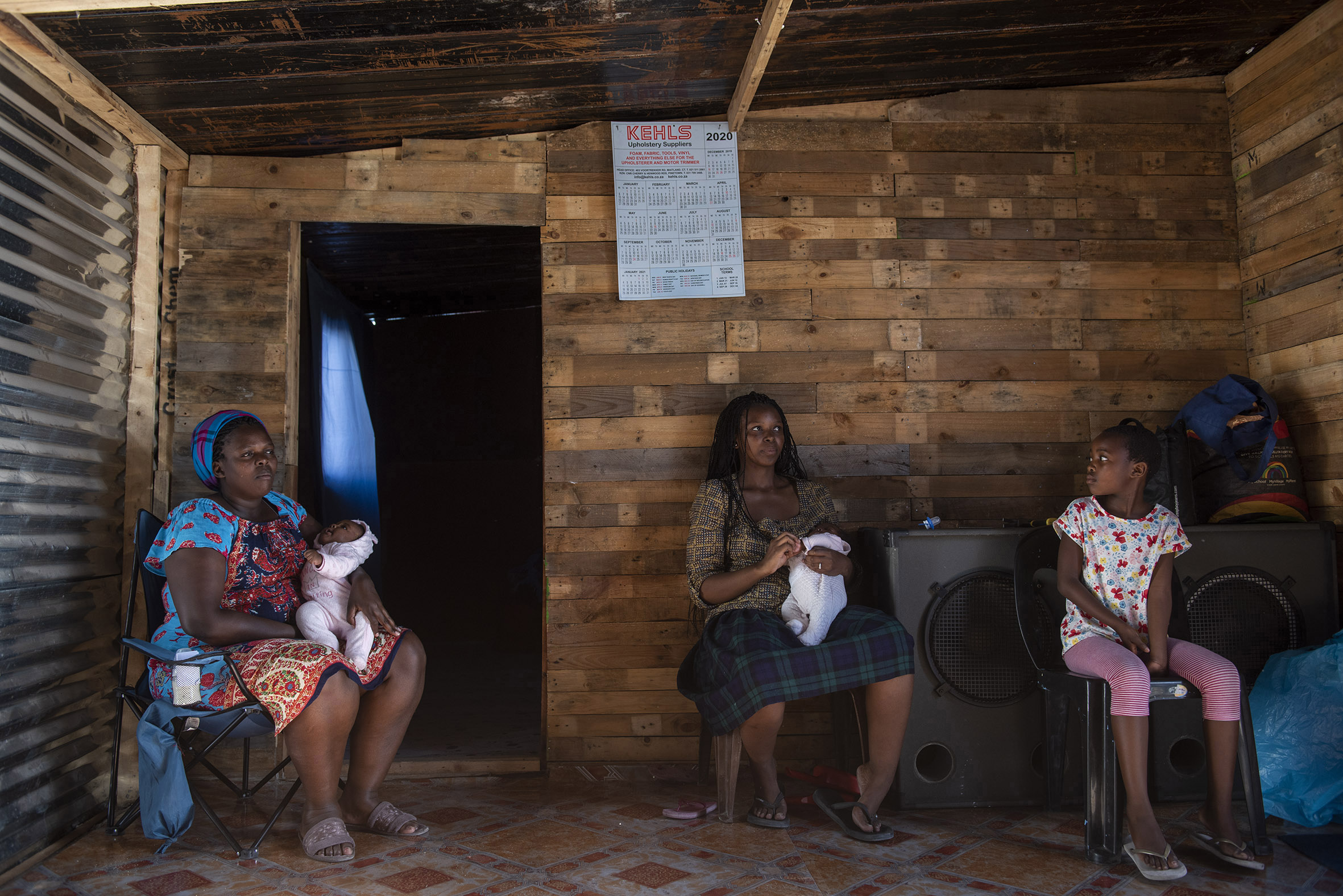
Lucia Njuze (left) & Abongile Baliso (right) sit in a friend’s home with her young child after having her dwelling destroyed by City of Cape Town law enforcement over the easter weekend. City of Cape Town law enforcement evicted several hundred people from open ground they had occupied over the Easter weekend. Khayelitsha Cape Town COVID-19 lockdown, 14 April 2020. (Photo: David Harrison)
Njuze was Kolossa’s neighbour. She was feeding her child when she was told to vacate her home. She fled to Baliso’s home, living in the rows of shacks not demolished by the City of Cape Town. Video footage shows how officers fired what seemed to be tear gas from several metres away into Abongile’s house.
Okay this is really fucked up. Police are trigger happy. @CityofCT demolished homes again, people stood & watched. A @SAPoliceService just had to shoot into someones house. For absolutely no reason. Then they cheer: “Hole in one”. There was a child in that house 🤬 pic.twitter.com/tFuXHCUlWB
— Axolile Notywala (@Xila_Notywala) April 13, 2020
Abongile’s two-month-old daughter Phawu breathed in the gas. In a panic, her mother took her to the Khayelitsha Hospital. A medical letter issued by the paediatric ward states the girl “started breathing fast and white foam/ saliva came from mouth” (sic). She was “rushed to Khayelitsha hospital”, admitted, and after assessment found to have suffered from “mild respiratory distress syndrome”. She stabilised overnight and could return the next day to her violent neighbourhood.
Residents told Daily Maverick they were worried about their young children who witnessed the violence. Some are said to display angst and hysterical behaviour at hearing loud noises.
By 15 April, Khayelitsha had officially recorded 21 confirmed Covid-19 infections.
***
The violent clash between the Khayelitsha residents and the City of Cape Town is now the subject of a court battle to be heard on Friday 17 April in the Western Cape High Court.
The City of Cape Town argues that land invasions are unsafe and have an impact on service delivery to other residents. In addition, the City has an interdict over its property that prohibits the erection of new houses. The court will have to decide whether this interdict is also applicable to the current residents, who are not the same residents against whom the court order was originally obtained.
In response to questions from Daily Maverick, Mayco’s Malusi Booi said the City of Cape Town “has been acting to prevent illegal occupation of the land in question since the court granted the interdict.
“Please note the actions by members of the public are illegal and in contempt of a court order. It is also in contravention of the national Covid-19 lockdown…. Further illegal invasions will jeopardise our Covid-19 response as a City, apart from it being illegal.”
The court must further decide whether the regulations published under the State of Disaster announced by President Cyril Ramaphosa in March will trump the existing court order.
These regulations were updated on March 31 by the minister of justice and correctional services to state that, in civil proceedings, “…service and execution of other processes by Sheriffs, including evictions, are not essential, and are suspended for the duration of the lockdown”.
Arguing on behalf of the Khayelitsha residents, the Legal Resources Centre (LRC) states that these directives from the government suggest that evictions are constitutionally inappropriate and inconsistent with the purpose of the lockdown.
It labelled the City’s conduct as “constitutionally and legally abhorrent”.
The LRC asks the court to declare that the demolition and the removal of residents’ building materials and personal belongings was unlawful and unconstitutional.
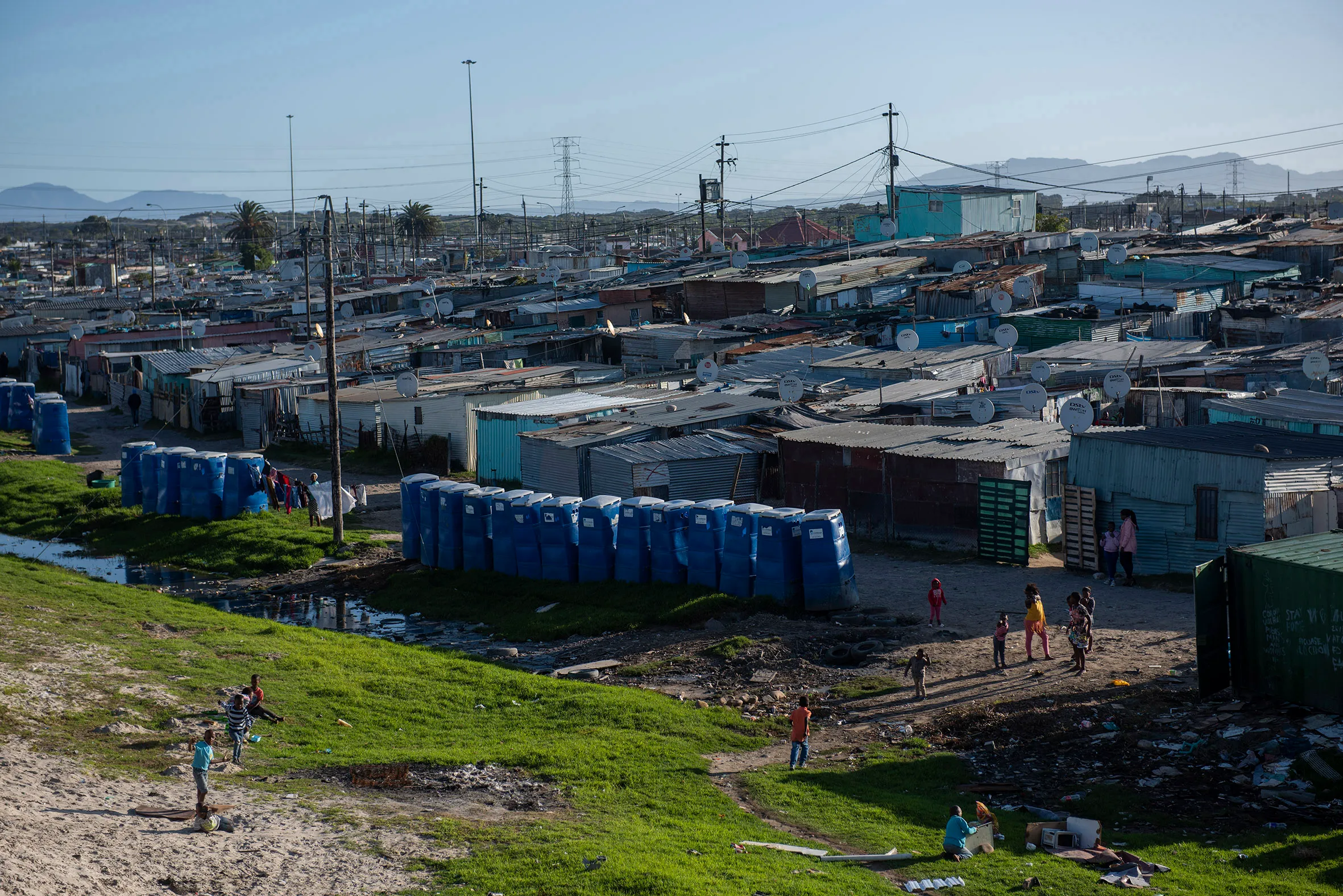
A view of Site-C informal settlement, Khayelitsha Cape Town COVID-19 lockdown, 14 April 2020. (Photo: David Harrison)
The residents ask that the City of Cape Town return their materials and personal possessions or provide each household with the equivalent alternative building materials and R2,000 per occupant as compensation. The residents further want to remain on the land until the lockdown has ended and until the City obtained a lawful eviction order under the Unlawful Occupation of Land Act.
The LRC further argues that anyone removed from their homes is acutely vulnerable to the health risks posed by the coronavirus, and to render people homeless would “defeat the purpose of the regulations”.
The destructive behaviour of its officials may pose a problem to the City’s argument.
“Law Enforcement were not only breaking down houses, they vandalised our belongings,” another resident Makhasa Mpolweni, 47, told Daily Maverick.
“We were trying to negotiate with them,” Mpolweni said, “asking if we can resolve the matter any other way. I was talking to closed ears. Some essential workers were at work. When they came back, there was nothing left.”
The Western Cape High Court instructed the City in 2018 that all possessions and building materials of demolished houses “shall be kept in safe custody for three weeks” until released to the lawful owner.
Khayelitsha residents report merciless and callous destruction. So much so, Mpolweni said, that he only managed to salvage his South African identification document from the debris of his house five days after it was demolished.
“I wasn’t allowed to save anything,” he claimed.
The second challenge the City of Cape Town will face is its assertion that it demolished only “unoccupied and incomplete structures” and did not conduct any “evictions”.
In its court papers, the City claimed that “…none of the structures contained any furniture, possessions or personal effects….”
Khayelitsha residents and the Legal Resources Centre called this bullshit, labelling the argument “unsustainable” and “constitutionally abhorrent”.
Nkuthazo Habile, deponent of the affidavit against the City of Cape Town, states under oath that he and his family had lived on the disputed land since November 2019, that some residents have occupied the space since June that year and that several families have made it their home.
“We were not arrested, but we had nowhere to go. The City officials did not offer us any alternative accommodation or tell us where we could go to find shelter,” Habile claimed.
Smartphone video footage taken by residents and journalists further show fully erected and fully furnished homes being demolished and fired at over the Easter weekend.
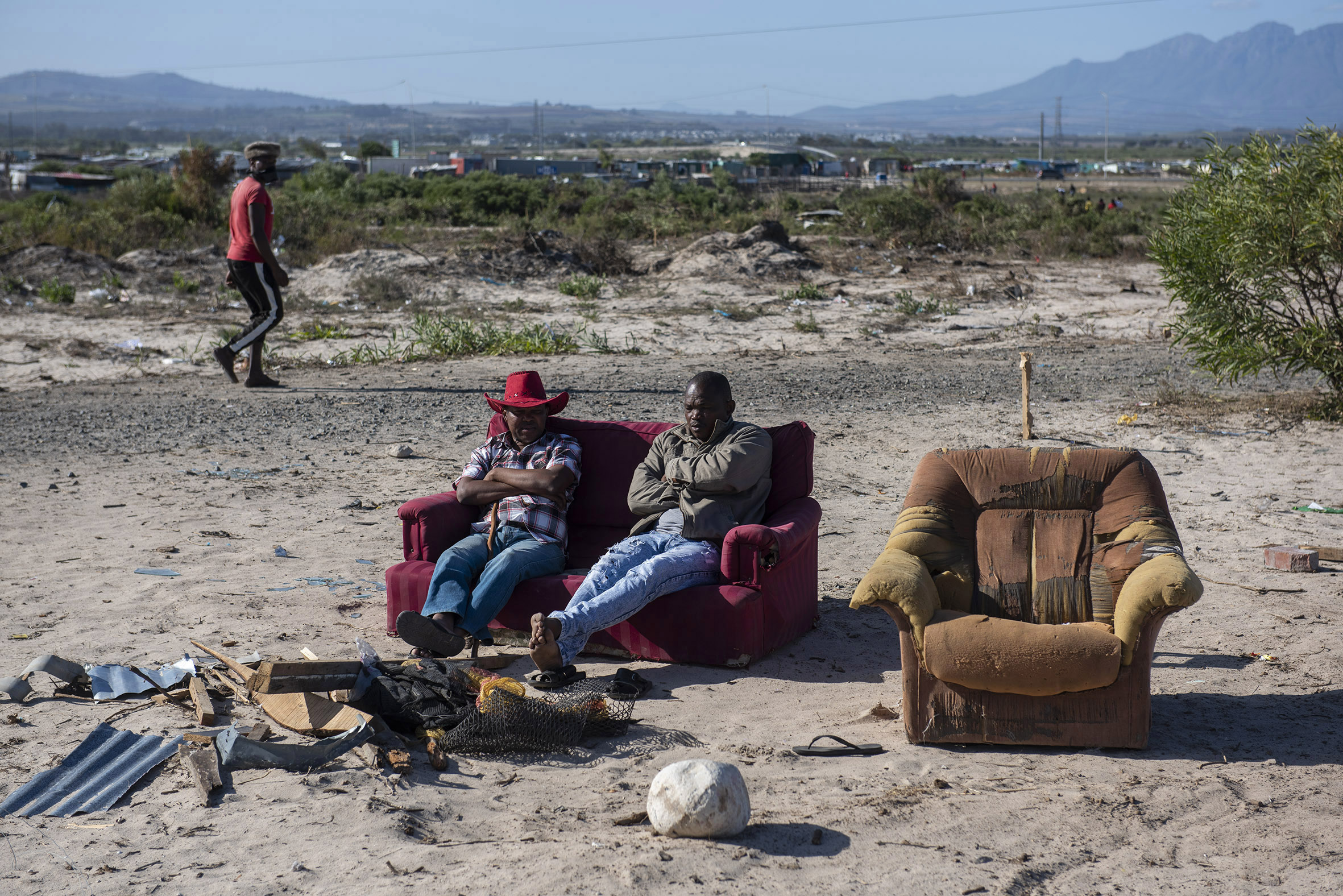
City of Cape Town law enforcement evicted several hundred people from open ground they had occupied over the easter weekend. Khayelitsha Cape Town COVID-19 lockdown, 14 April 2020. (Photo: David Harrison)
When Daily Maverick visited the scene, Khayelitsha residents were sitting on ruined couches where their homes once were.
It may prove difficult to sustain an argument that the homes were “unoccupied and incomplete” without any furniture in them under these circumstances.
It is equivocal why the City of Cape Town would evict or remove or demolish (depending on which semantic game you wish to play) people and homes during a catastrophic pandemic.
Even more opaque is who exactly issued the orders to enforce the eviction/removal/demolition.
The answers provided by Mayco’s Malusi Booi and executive director for safety and security Richard Bosman to Daily Maverick’s direct questions were opaque, nonsensical and unhelpful.
Bosman declined to explain or simply ignored questions about who issued the demolition orders and who the commanders of the units operating in Khayelitsha during the Easter weekend were. (See City of Cape Town response here)
Booi answered a direct question about the definition of what the City sees as an “unoccupied or incomplete structure” as “each case is assessed on merit and also in terms of legal prescripts consonant with the provisions of the Prevention of Illegal Eviction Act”.
Complaints by Khayelitsha residents and a member of the Human Rights Commission that officials were not wearing badges or tags that reflected their names, were brushed off by Bosman telling Daily Maverick “all staff can be identified in the event that it is required”.
Bosman further claimed that “standard operating procedures are internal documents”.
Standard operating procedures are, in theory, drafted according to a unit’s mandate and the Constitution and are therefore an important yardstick against which a unit’s actions can be measured. Fobbing off a question about these suggests a strange unwillingness to be transparent and accountable. (Detailed standard operating procedures for the national police (SAPS) are, for example, published on their website.)
Since President Cyril Ramaphosa announced the national lockdown on 26 March, journalists countrywide have reported several evictions of residents in suburbs in Cape Town, Johannesburg and Durban.
The South Gauteng High Court in Johannesburg last week ruled that the City contravened the national lockdown rules when it removed 23 occupants from a building on April 6. The Durban High Court ruled in favour of the City of eThekwini which evicted illegal occupiers of a City-owned property on the first day of the lockdown.
Minister of Human Settlements, Water and Sanitation Lindiwe Sisulu asked municipalities and private landowners to stop evictions for the duration of the national lockdown. This 180 degree turnaround is despite her bizarre comments in March about “de-densifying” informal settlements. DM
Update, Friday, 6pm: Residents of Empolweni in Khayelitsha can, for now, rebuild the homes demolished over the Easter weekend by the City of Cape Town, the Western Cape High Court ordered on Friday, 17 April 2020. The city’s actions to evict and demolish (or break down and remove, depending on which semantic game one wishes to play) were not permitted during the lockdown period and is therefore illegal. In an interim order, Judge Bryan Hack ordered the City of Cape Town to return all the building materials in its possession that were removed from the site. The applicants may erect and occupy 49 structures, using the returned material. The order remains in force until lockdown regulations are no longer in force.
Judge Hack was mindful of City of Cape Town’s rights, ordering too that no other person is allowed to occupy the property or erect any new structures. He ordered the applicants to “use their best endeavours to ensure that the number of structures do not increase”. No more people are allowed to move to the site. The matter will be heard in full after the lockdown has ended.
"Information pertaining to Covid-19, vaccines, how to control the spread of the virus and potential treatments is ever-changing. Under the South African Disaster Management Act Regulation 11(5)(c) it is prohibited to publish information through any medium with the intention to deceive people on government measures to address COVID-19. We are therefore disabling the comment section on this article in order to protect both the commenting member and ourselves from potential liability. Should you have additional information that you think we should know, please email [email protected]"






 Become an Insider
Become an Insider